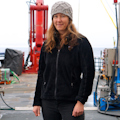Laurie Juranek, Ph.D.
Associate Professor, Oregon State University
SCOPE-Gradients Project: Community Metabolism Across Physical and Ecological Gradients
Throughout most of the world’s oceans, rates of phytoplankton production and community respiration are very nearly in balance. Material is turned over with remarkable efficiency by microbes uniquely adapted to their surroundings. But what happens when the system is perturbed? How does that net balance of community growth and respiration—what’s known as community metabolism—change as physical or ecological shifts restructure the environment? These stimuli can happen quite frequently, even in regions of the ocean that seem ‘stable’ from a distance.
My role in the Gradients project is to track the response of ocean metabolism across physical and ecological transitions. Because the sum of growth and loss rates are often so close to zero, small errors from tracking these terms in bottles can lead to large uncertainties in both sign and magnitude of net ecosystem function. To avoid this, I utilize high-resolution observations of the ratio of dissolved molecular oxygen, or O2, to argon, which allows us to identify net biological production (or loss) of O2 by observing the bulk change of these gases in the surface. Together with high resolution optical and flow cytometry measurements made by other Gradients investigators, we can evaluate response of community metabolism to physical and ecological gradients.
Bio:
Laurie Juranek is an associate professor in the College of Earth, Ocean, and Atmospheric Sciences at Oregon State University. She received her Ph.D. in chemical oceanography from the University of Washington and was awarded a National Research Council fellowship as a postdoctoral scholar to study coastal carbon chemistry with the NOAA Pacific Marine Environmental Laboratory. Her research uses novel gas tracers to constrain rates of key biological and physical processes in environments spanning the globe, from polar to subtropical ecosystems.